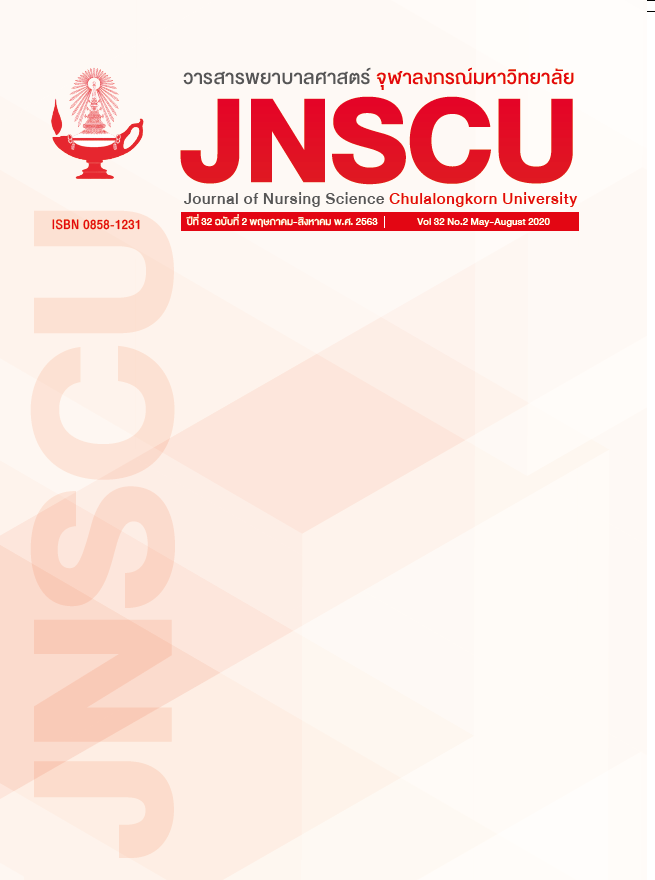ประสบการณ์ของผู้ดูแลหลักในการดูแลผู้ป่วยจิตเภทที่ไม่กลับป่วยซ้ำ
คำสำคัญ:
ประสบการณ์ของผู้ดูแลหลัก, การดูแล, ผู้ป่วยจิตเภทที่ไม่กลับป่วยซ้ำบทคัดย่อ
วัตถุประสงค์: เพื่อบรรยายประสบการณ์ของผู้ดูแลหลักในการดูแลผู้ป่วยจิตเภทที่ไม่กลับป่วยซ้ำ
รูปแบบการวิจัย: การวิจัยเชิงคุณภาพ
วิธีดำเนินการวิจัย: การศึกษาครั้งนี้เป็นการวิจัยเชิงคุณภาพแบบปรากฏการณ์วิทยาการตีความตามแนวคิดของมาร์ติน ไฮเดกเกอร์ ผู้ให้ข้อมูลหลักจำนวน 11 คน โดยคัดเลือกผู้ให้ข้อมูลหลักแบบเฉพาะเจาะจง เก็บรวบรวมข้อมูลด้วยการสัมภาษณ์เชิงลึก การบันทึกเทปแล้วนำข้อมูลมาถอดคำต่อคำ การสังเกต และการจดบันทึกในระหว่างการสัมภาษณ์ ร่วมกับวิเคราะห์เนื้อหาตามแบบวิธีการของแวน มาเนน
ผลการวิจัยสรุปดังนี้: ผลการศึกษาสามารถแบ่งเป็น 2 ส่วน ได้แก่ การให้ความหมายของผู้ดูแลหลักในการดูแลผู้ป่วยจิตเภทที่ไม่กลับป่วยซ้ำ และประสบการณ์ของผู้ดูแลหลักในการดูแลผู้ป่วยจิตเภทที่ไม่กลับป่วยซ้ำ โดยการให้ความหมายของผู้ดูแลหลักในการดูแลผู้ป่วยจิตเภทที่ไม่กลับป่วยซ้ำ คือ การดูแลเอาใจใส่เพื่อไม่ให้กลับป่วยซ้ำ เกิดจากความรักใคร่ ห่วงใยและผูกพัน ผู้ป่วยคือคนสำคัญ มีคุณค่าและมีความหมายต่อผู้ดูแลหลัก พบ 2 ประเด็นย่อย คือ 1. การทำหน้าที่ด้วยความรักความห่วงใย และ 2. เกิดความผูกพันรักใคร่ในครอบครัว ส่วนประสบการณ์ของผู้ดูแลหลักในการดูแลผู้ป่วยจิตเภทที่ไม่กลับป่วยซ้ำ พบ 3 ประเด็นหลัก และ 6 ประเด็นย่อย ดังนี้ 1. การรับรู้ว่าผู้ป่วยผิดปกติและแสวงหาการรักษา 1.1) การรับรู้ว่าผู้ป่วยมีอาการผิดปกติ 1.2) แสวงหาการรักษาที่เหมาะสมกับผู้ป่วย 2. การทำใจยอมรับสิ่งที่เกิดขึ้น 2.1) หลากหลายความทุกข์ถาโถมเข้ามาในชีวิต 2.2) การทำใจยอมรับเพื่อตนเองและผู้ป่วย 3. การดูแลฟื้นฟูและป้องกันไม่ให้ผู้ป่วยกลับป่วยซ้ำ 3.1) การทำหน้าที่ตอบสนองทางด้านร่างกาย จิตใจ และสังคมของผู้ป่วย 3.2) ให้ผู้ป่วยได้กลับมาประกอบอาชีพและมีรายได้เป็นของตนเอง
สรุป: ผลการศึกษาครั้งนี้ทำให้เข้าใจประสบการณ์ของผู้ดูแลหลักในการดูแลผู้ป่วยจิตเภทที่ไม่กลับป่วยซ้ำ ตั้งแต่ผู้ป่วยจิตเภทเริ่มมีอาการทางจิต การดูแลฟื้นฟูเพื่อป้องกันการกลับป่วยซ้ำ และผลกระทบโดยตรงที่เกิดขึ้นกับผู้ดูแลหลัก เป็นแนวทางสำหรับพยาบาลและสหวิชาชีพสามารถนำไปพัฒนาระบบการดูแลทั้งผู้ป่วยจิตเภทที่ไม่กลับป่วยซ้ำและผู้ดูแลหลักอย่างมีประสิทธิภาพ และเหมาะสมเพื่อป้องกันการกลับป่วยซ้ำ
ดาวน์โหลด
เผยแพร่แล้ว
ฉบับ
ประเภทบทความ
สัญญาอนุญาต

อนุญาตภายใต้เงื่อนไข Creative Commons Attribution-NonCommercial-NoDerivatives 4.0 International License.
##default.contextSettings.thaijo.licenseTerms##


